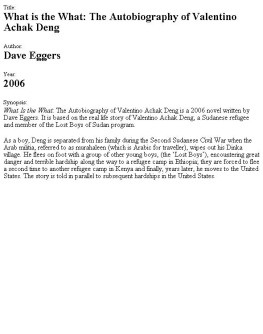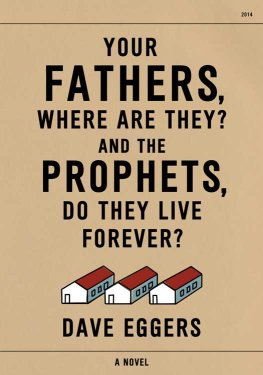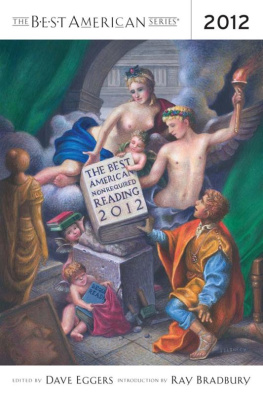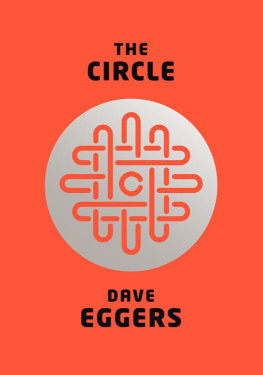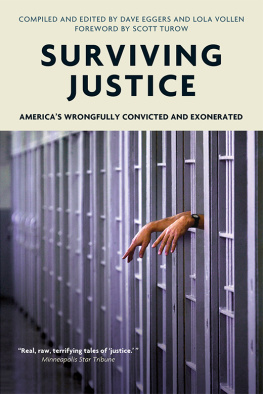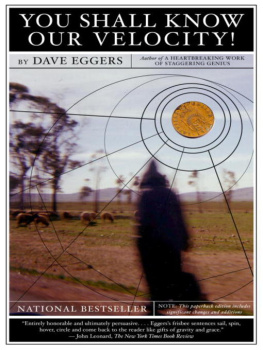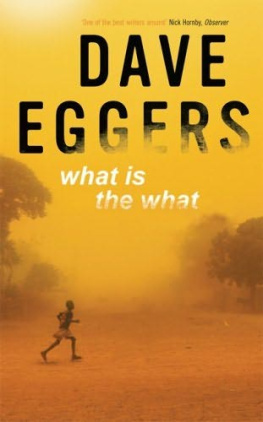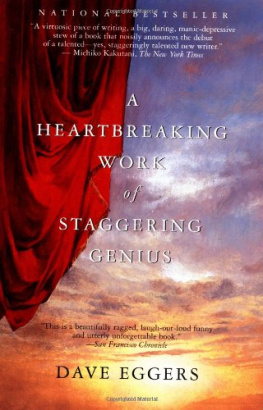Eggers Dave - 2006: What is the What
Here you can read online Eggers Dave - 2006: What is the What full text of the book (entire story) in english for free. Download pdf and epub, get meaning, cover and reviews about this ebook. publisher: Prefers to remain anonymous, genre: Detective and thriller. Description of the work, (preface) as well as reviews are available. Best literature library LitArk.com created for fans of good reading and offers a wide selection of genres:
Romance novel
Science fiction
Adventure
Detective
Science
History
Home and family
Prose
Art
Politics
Computer
Non-fiction
Religion
Business
Children
Humor
Choose a favorite category and find really read worthwhile books. Enjoy immersion in the world of imagination, feel the emotions of the characters or learn something new for yourself, make an fascinating discovery.
- Book:2006: What is the What
- Author:
- Publisher:Prefers to remain anonymous
- Genre:
- Rating:4 / 5
- Favourites:Add to favourites
- Your mark:
- 80
- 1
- 2
- 3
- 4
- 5
2006: What is the What: summary, description and annotation
We offer to read an annotation, description, summary or preface (depends on what the author of the book "2006: What is the What" wrote himself). If you haven't found the necessary information about the book — write in the comments, we will try to find it.
2006: What is the What — read online for free the complete book (whole text) full work
Below is the text of the book, divided by pages. System saving the place of the last page read, allows you to conveniently read the book "2006: What is the What" online for free, without having to search again every time where you left off. Put a bookmark, and you can go to the page where you finished reading at any time.
Font size:
Interval:
Bookmark:
Title:
What is the What: The Autobiography of Valentino Achak Deng
Author:
Dave Eggers
Year:
2006
Synopsis:
What Is the What: The Autobiography of Valentino Achak Deng is a 2006 novel written by Dave Eggers. It is based on the real life story of Valentino Achak Deng, a Sudanese refugee and member of the Lost Boys of Sudan program.
As a boy, Deng is separated from his family during the Second Sudanese Civil War when the Arab militia, referred to as murahaleen (which is Arabic for traveller), wipes out his Dinka village. He flees on foot with a group of other young boys, (the Lost Boys), encountering great danger and terrible hardship along the way to a refugee camp in Ethiopia; they are forced to flee a second time to another refugee camp in Kenya and finally, years later, he moves to the United States. The story is told in parallel to subsequent hardships in the United States.
T his book is the soulful account of my life: from the time I was separated from my family in Marial Bai to the thirteen years I spent in Ethiopian and Kenyan refugee camps, to my encounters with vibrant Western cultures, in Atlanta and elsewhere.
As you read this book, you will learn about the two and a half million people who have perished in Sudans civil war. I was just a boy when the war began. As a helpless human, I survived by trekking across many punishing landscapes while being bombed by Sudanese air forces, while dodging land mines, while being preyed upon by wild beasts and human killers. I fed on unknown fruits, vegetables, leaves, animal carcasses and sometimes went with nothing for days. At certain points, the difficulty was unbearable. I hated myself and attempted to take my own life. Many of my friends, and thousands of my fellow countrymen, did not make it through these struggles alive.
This book was born out of the desire on the part of myself and the author to reach out to others to help them understand the atrocities many successive governments of Sudan committed before and during the civil war. To that end, over the course of many years, I told my story orally to the author. He then concocted this novel, approximating my own voice and using the basic events of my life as the foundation. Because many of the passages are fictional, the result is called a novel. It should not be taken as a definitive history of the civil war in Sudan, nor of the Sudanese people, nor even of my brethren, those known as the Lost Boys. This is simply one mans story, subjectively told. And though it is fictionalized, it should be noted that the world I have known is not so different from the one depicted within these pages. We live in a time when even the most horrific events in this book could occur, and in most cases did occur.
Even when my hours were darkest, I believed that some day I could share my experiences with readers, so as to prevent the same horrors from repeating themselves. This book is a form of struggle, and it keeps my spirit alive to struggle. To struggle is to strengthen my faith, my hope, and my belief in humanity. Thank you for reading this book, and I wish you a blessed day.
VALENTINO ACHAK DENG, ATLANTA, 2006
I have no reason not to answer the door so I answer the door. I have no tiny round window to inspect visitors so I open the door and before me is a tall, sturdily built African-American woman, a few years older than me, wearing a red nylon sweatsuit. She speaks to me loudly. You have a phone, sir?
She looks familiar. I am almost certain that I saw her in the parking lot an hour ago, when I returned from the convenience store. I saw her standing by the stairs, and I smiled at her. I tell her that I do have a phone.
My car broke down on the street, she says. Behind her, it is nearly night. I have been studying most of the afternoon. Can you let me use your phone to call the police? she asks.
I do not know why she wants to call the police for a car in need of repair, but I consent. She steps inside. I begin to close the door but she holds it open. Ill just be a second, she says. It does not make sense to me to leave the door open but I do so because she desires it. This is her country and not yet mine.
Wheres the phone? she asks.
I tell her my cell phone is in my bedroom. Before I finish the sentence, she has rushed past me and down the hall, a hulk of swishing nylon. The door to my room closes, then clicks. She has locked herself in my bedroom. I start to follow her when I hear a voice behind me.
Stay here, Africa.
I turn and see a man, African-American, wearing a vast powder-blue baseball jacket and jeans. His face is not discernible beneath his baseball hat but he has his hand on something near his waist, as if needing to hold up his pants.
Are you with that woman? I ask him. I dont understand anything yet and am angry.
Just sit down, Africa, he says, nodding to my couch.
I stand. What is she doing in my bedroom?
Just sit your ass down, he says, now with venom.
I sit and now he shows me the handle of the gun. He has been holding it all along, and I was supposed to know. But I know nothing; I never know the things I am supposed to know. I do know, now, that I am being robbed, and that I want to be elsewhere.
It is a strange thing, I realize, but what I think at this moment is that I want to be back in Kakuma. In Kakuma there was no rain, the winds blew nine months a year, and eighty thousand war refugees from Sudan and elsewhere lived on one meal a day. But at this moment, when the woman is in my bedroom and the man is guarding me with his gun, I want to be in Kakuma, where I lived in a hut of plastic and sandbags and owned one pair of pants. I am not sure there was evil of this kind in the Kakuma refugee camp, and I want to return. Or even Pinyudo, the Ethiopian camp I lived in before Kakuma; there was nothing there, only one or two meals a day, but it had its small pleasures; I was a boy then and could forget that I was a malnourished refugee a thousand miles from home. In any case, if this is punishment for the hubris of wanting to leave Africa, of harboring dreams of college and solvency in America, I am now chastened and I apologize. I will return with bowed head. Why did I smile at this woman? I smile reflexively and it is a habit I need to break. It invites retribution. I have been humbled so many times since arriving that I am beginning to think someone is trying desperately to send me a message, and that message is Leave this place.
As soon as I settle on this position of regret and retreat, it is replaced by one of protest. This new posture has me standing up and speaking to the man in the powder-blue coat. I want you two to leave this place, I say.
The powder man is instantly enraged. I have upset the balance here, have thrown an obstacle, my voice, in the way of their errand.
Are you telling me what do, motherfucker?
I stare into his small eyes.
Tell me that, Africa, are you telling me what to do, motherfucker?
The woman hears our voices and calls from the bedroom: Will you take care of him? She is exasperated with her partner, and he with me.
Powder tilts his head to me and raises his eyebrows. He takes a step toward me and again gestures toward the gun in his belt. He seems about to use it, but suddenly his shoulders slacken, and he drops his head. He stares at his shoes and breathes slowly, collecting himself. When he raises his eyes again, he has regained himself.
Youre from Africa, right?
I nod.
All right then. That means were brothers.
I am unwilling to agree.
And because were brothers and all, Ill teach you a lesson. Dont you know you shouldnt open your door to strangers?
The question causes me to wince. The simple robbery had been, in a way, acceptable. I have seen robberies, have been robbed, on scales much smaller than this. Until I arrived in the United States, my most valuable possession was the mattress I slept on, and so the thefts were far smaller: a disposable camera, a pair of sandals, a ream of white typing paper. All of these were valuable, yes, but now I own a television, a VCR, a microwave, an alarm clock, many other conveniences, all provided by the Peachtree United Methodist Church here in Atlanta. Some of the things were used, most were new, and all had been given anonymously. To look at them, to use them daily, provoked in me a shuddera strange but genuine physical expression of gratitude. And now I assume all of these gifts will be taken in the next few minutes. I stand before Powder and my memory is searching for the time when I last felt this betrayed, when I last felt in the presence of evil so careless.
Next pageFont size:
Interval:
Bookmark:
Similar books «2006: What is the What»
Look at similar books to 2006: What is the What. We have selected literature similar in name and meaning in the hope of providing readers with more options to find new, interesting, not yet read works.
Discussion, reviews of the book 2006: What is the What and just readers' own opinions. Leave your comments, write what you think about the work, its meaning or the main characters. Specify what exactly you liked and what you didn't like, and why you think so.

